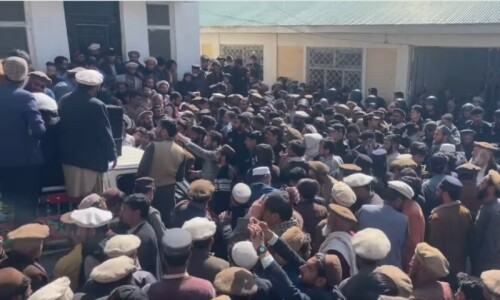DAHANU: Fire tore through an Indian train full of sleeping passengers on Wednesday, killing nine people and forcing survivors to break open doors to escape, officials and a witness said.
The blaze raced through three carriages shortly after the train left Mumbai for the northern city of Dehradun. It comes less than a fortnight after 26 people were killed in a similar tragedy on India's massive rail network.
“Nine people have died from the fire which spread to three coaches in the night. The fire broke out at about 2:30 am,” said Western Railway spokesman Sharat Chandrayan.
The fire started as the train was travelling through Thane district bordering Mumbai and spread through the three carriages before a guard at a railway station raised the alarm.
“The gateman at a railway station informed the guard inside the train,” Chandrayan said.
Railway police and forensic officers were poring over the charred carriages at Dahanu Road station to try to determine how the fire started, an AFP reporter said.
Five of the victims have been formally identified but more time was needed to name the remaining four because their bodies were so badly burnt, station master Anil Kumar Garg said.
Several people were treated for burns at a nearby hospital, a railway police official said.
The Mumbai-Dehradun Express continued on its journey later in the morning after the burnt-out carriages were detached.
Many passengers managed to escape from the blazing and smoke-filled coaches by breaking open the back doors, a survivor, Mehul, told news channel CNN-IBN, but he said others died of suffocation.
“All the windows and doors were sealed shut and the compartments were packed with smoke. Some escaped but those who couldn't died because they couldn't breathe,” Mehul told the channel.
Photos showed blackened and gutted carriage interiors, with only the metal frames of the berths remaining.
Railways Minister Mallikarjun Kharge ordered compensation for relatives of the victims and an enquiry into the incident, another Western Railway official said.
The families of the dead will receive 500,000 rupees (8,000 dollars) with the injured getting 50,000.
Last month a fire raced through a train carriage packed with sleeping passengers in the southeastern state of Andhra Pradesh, killing 26 people and forcing terrified passengers to smash windows in a bid to escape.
The poorly funded and accident-prone Indian rail network, one of the world's largest, is still the main form of long-distance travel in the vast country.
The exit doors of Indian trains are customarily locked at night, while the carriage windows are covered with bars, making escape difficult.
These tragedies come a little over a year after another train accident also in the state of Andhra Pradesh killed 32 people and shone a spotlight on the rail network's dismal safety record.
India's worst rail accident was in 1981 when a train plunged into a river in the eastern state of Bihar, killing an estimated 800 people.
Many also die unlawfully crossing the tracks, which lack proper barriers and crossing points. An official report in 2012 found that 15,000 are killed this way in India every year — a figure the government described as a “massacre”.














































